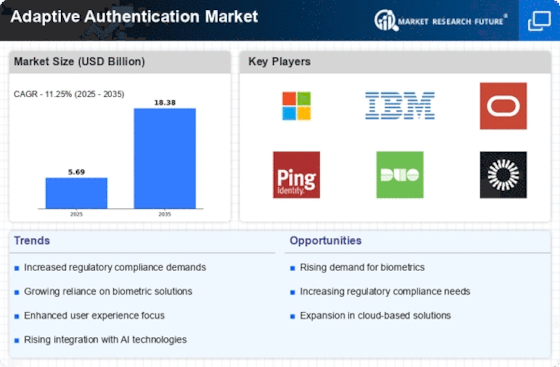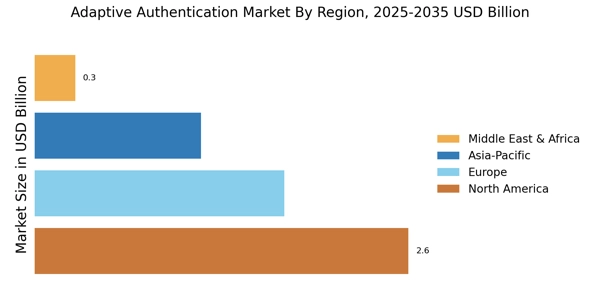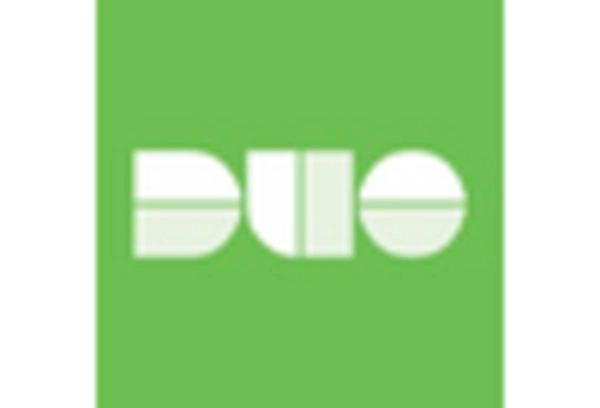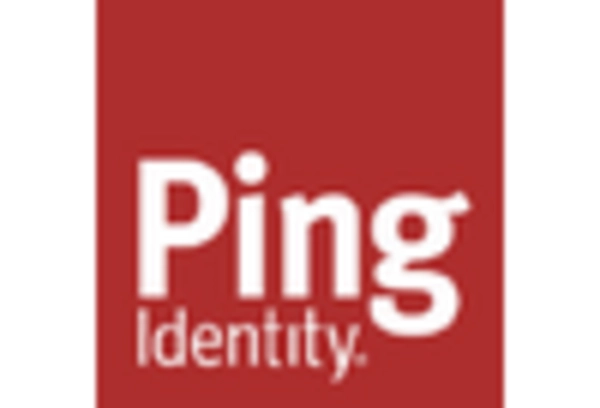Increasing Cybersecurity Threats
The Adaptive Authentication Market is experiencing a surge in demand due to the escalating frequency and sophistication of cyber threats. Organizations are increasingly recognizing the necessity of robust security measures to protect sensitive data. In 2025, it is estimated that cybercrime will cost businesses over 10 trillion dollars annually, prompting a shift towards adaptive authentication solutions. These solutions provide a dynamic approach to security, adjusting authentication requirements based on user behavior and risk factors. As a result, companies are investing heavily in adaptive authentication technologies to mitigate risks and safeguard their assets. This trend indicates a growing awareness of the importance of cybersecurity, driving the expansion of the Adaptive Authentication Market.
Demand for Enhanced User Experience
In the Adaptive Authentication Market, there is a notable trend towards enhancing user experience while maintaining security. Organizations are increasingly aware that cumbersome authentication processes can lead to user frustration and abandonment. Adaptive authentication solutions offer a seamless experience by adjusting security measures based on contextual factors, such as location and device. This approach not only improves user satisfaction but also encourages higher engagement rates. As businesses strive to balance security with usability, the demand for adaptive authentication technologies is expected to rise. In 2025, the market for user-centric security solutions is projected to grow significantly, reflecting the importance of user experience in the Adaptive Authentication Market.
Regulatory Pressures and Compliance
The Adaptive Authentication Market is significantly influenced by regulatory pressures and compliance requirements. With the introduction of stringent data protection regulations, organizations are compelled to adopt advanced security measures to avoid hefty fines and reputational damage. Regulations such as the General Data Protection Regulation (GDPR) and the California Consumer Privacy Act (CCPA) mandate that businesses implement robust authentication mechanisms to protect user data. As compliance becomes a critical concern, the demand for adaptive authentication solutions is likely to increase. In 2025, it is anticipated that organizations will allocate a larger portion of their budgets to ensure compliance, thereby driving growth in the Adaptive Authentication Market.
Advancements in Technology and Innovation
Technological advancements and innovation are pivotal in shaping the Adaptive Authentication Market. The integration of machine learning and artificial intelligence into authentication processes enhances the ability to analyze user behavior and detect anomalies in real-time. These technologies enable adaptive authentication systems to evolve continuously, improving their effectiveness against emerging threats. As organizations seek to leverage cutting-edge technologies to bolster their security frameworks, the demand for innovative adaptive authentication solutions is likely to rise. In 2025, the market is expected to witness significant growth driven by technological advancements, underscoring the importance of innovation in the Adaptive Authentication Market.
Growth of Remote Work and Digital Transformation
The shift towards remote work and digital transformation is a key driver for the Adaptive Authentication Market. As organizations embrace flexible work arrangements, the need for secure access to corporate resources from various locations and devices has become paramount. Adaptive authentication solutions provide a means to ensure that only authorized users can access sensitive information, regardless of their location. This trend is expected to continue, with remote work becoming a permanent fixture in many industries. By 2025, the market for remote access security solutions is projected to expand, highlighting the critical role of adaptive authentication in facilitating secure remote work environments within the Adaptive Authentication Market.

















